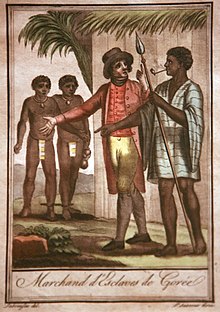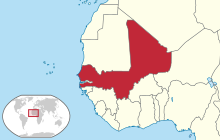සෙනගාලය හි ඉතිහාසය
මුල් සහ පූර්ව යටත් විජිත යුගය
සංස්කරණයප්රදේශය පුරා ඇති පුරාවිද්යාත්මක සොයාගැනීම්වලින් පෙනී යන්නේ සෙනගල් ප්රාග් ඓතිහාසික යුගයේ ජනාවාස වූ අතර විවිධ ජනවාර්ගික කණ්ඩායම් විසින් අඛණ්ඩව අත්පත් කරගෙන ඇති බවයි. සමහර රාජධානි හත්වන සියවසේදී පමණ නිර්මාණය විය: හයවන සියවසේ ටක්රූර්, 13වන සහ 14වන සියවස්වලදී නාමන්දිරු සහ ජොලොෆ් අධිරාජ්යය. නැගෙනහිර සෙනගාලය වරක් ඝානා අධිරාජ්යයේ කොටසක් විය.
ඉස්ලාම් ආගම හඳුන්වා දෙනු ලැබුවේ ටූකූලියර් සහ සොනින්කේ විසින් මාග්රෙබ්හි අල්මොරාවිඩ් රාජවංශය සමඟ සම්බන්ධතා ඇති කර ගැනීමෙනි. මෙම ව්යාපාරය සාම්ප්රදායික ආගම්වල ජනවාර්ගිකයන්ගෙන් ප්රතිරෝධයට මුහුණ පෑවේය, විශේෂයෙන්ම සෙරර්ස්.[1][2]
13 වන සහ 14 වන ශතවර්ෂ වලදී, මෙම ප්රදේශය නැගෙනහිර අධිරාජ්යයන්ගේ බලපෑමට යටත් විය; සෙනගල්හි ජොලොෆ් අධිරාජ්යය ද මෙම කාලය තුළ පිහිටුවන ලදී. සෙනෙගම්බියා ප්රදේශයේ, 1300 සහ 1900 අතර, ජනගහනයෙන් තුනෙන් එකකට ආසන්න ප්රමාණයක් වහල්භාවයට පත් විය, සාමාන්යයෙන් යුද්ධයේදී වහල්භාවයට ගෙන යාමේ ප්රතිඵලයක් ලෙසය.[3]
14 වන ශතවර්ෂයේදී ජෝලොෆ් අධිරාජ්යය වඩාත් බලවත් වූ අතර, කේයර් සහ බාඕල්, සිනේ, සලෝම්, වාලෝ, ෆුටා ටූරෝ සහ බම්බුක් හෝ වර්තමාන බටහිර අප්රිකාවේ බොහෝ රාජධානි එක්සේසත් කළේය. අධිරාජ්යය යුධ ජයග්රහණ මත ගොඩනඟනවාට වඩා විවිධ ප්රාන්තවල ස්වේච්ඡා සම්මේලනයක් විය.[4][5] අධිරාජ්යය ආරම්භ කරන ලද්දේ සේරර්[6][7] කොටසක් වන 'න්ඩිඅඩිඅනේ න්ඩියේ' (Ndiadiane Ndiaye) සහ කොටසක් ටූකූලර් (Toucouleur) විසින්, බොහෝ ජනවර්ග සමඟ සභාගයක් පිහිටුවීමට සමත් වූ නමුත්, 1549 දී පමණ අමාරි න්ගෝන් සෝබෙල් ෆෝල් විසින් ලෙලේ ෆවුලි ෆාක් පරාජය කර මරා දැමීමත් සමඟ බිඳ වැටුණි. .
යටත් විජිත යුගය
සංස්කරණය
15 වන ශතවර්ෂයේ මැද භාගයේදී, පෘතුගීසීන් සෙනගල් වෙරළ තීරයට ගොඩ බැස්ස අතර, ප්රංශ ඇතුළු අනෙකුත් රටවල් නියෝජනය කරන වෙළඳුන් විසින් අනුගමනය කරන ලදී.[8] විවිධ යුරෝපීය බලවතුන් - පෘතුගාලය, නෙදර්ලන්තය සහ මහා බ්රිතාන්යය - 15 වන සියවසේ සිට ප්රදේශයේ වෙළඳාම සඳහා තරඟ කළහ.
1677 දී, ප්රංශය අත්ලාන්තික් සාගරයේ වහල් වෙළඳාමේ කුඩා පිටවීමේ ස්ථානයක් බවට පත් වූ දෙයෙහි පාලනය ලබා ගත්තේය: නූතන ඩකාර් අසල පිහිටි ගෝරී දූපත, ප්රධාන භූමියේ සටන් කරන ප්රධානීන්ගෙන් වහලුන් මිල දී ගැනීමට පදනමක් ලෙස භාවිතා කරන ලදී.[9][10]
යුරෝපීය මිෂනාරිවරුන් 19 වන සියවසේදී සෙනගල් සහ කැසමන්ස් වෙත ක්රිස්තියානි ධර්මය හඳුන්වා දෙන ලදී. 1850 ගණන්වල ප්රංශ ජාතිකයන් වහල්භාවය අහෝසි කිරීමෙන් පසුව සහ වාලෝ, කේයර්, බෝල් සහ ජොලොෆ් වැනි ස්වදේශික රාජධානි එකතු කරමින්,[11] අහෝසි කිරීමේ මූලධර්මයක් ප්රවර්ධනය කිරීමට පටන් ගත් පසු, සෙනගාලයේ ප්රධාන භූමියට ව්යාප්ත වීමට පටන් ගත්හ. ලුවී ෆයිදර්බේ ආණ්ඩුකාරවරයා යටතේ ප්රංශ යටත් විජිතවාදීන් ක්රමානුකූලව ආක්රමණය කර සයින් සහ සලෝම්හි සෙරර් රාජධානි හැර අනෙකුත් සියලුම රාජධානි අත්පත් කර ගත්හ.[4][12]

යෝරෝ ඩයෝ ෆොස්-ගලෝඩ්ජිනා ප්රාන්තයේ අණදෙන නිලධාරියා වූ අතර ඔහු 1861 සිට 1914 දක්වා ප්රධානියා ලෙස සේවය කළ ලුවී ෆයිඩර්බේ[13] විසින් වාලෝ (ඕඕලෝ) වෙත පිහිටුවන ලදී.[14] ප්රංශ ව්යාප්තියට සෙනගාලියානු ප්රතිරෝධය අර්ධ වශයෙන් මෙහෙයවනු ලැබුවේ ලැට්-ඩියර්, ඩැමෙල් ඔෆ් කේයර් සහ මාඩ් ඒ සිනිග් කුම්බා එන්ඩොෆෙන් ෆමාක් ජූෆ් (ද මාඩ් අ සිනිග්, සයින් හි රජු), එහි ප්රතිඵලයක් ලෙස සුප්රසිද්ධ ලෝගන්ඩේම් සටන - සයින් හි සෙරර් රජු බලවත් ප්රංශ යටත් විජිත අධිරාජ්යයට එරෙහිව යුද්ධයට ගිය අතර, ජිලෝර් සටනේදී ඔවුන්ගේ නින්දිත පරාජයෙන් පසු සයින්ට එරෙහිව ප්රංශ ජාතිකයන් පළිගැනීමට තීරණය කළහ. ලෝගන්ඩේම් සටන යනු සෙනෙගම්බියානු භූමියේ ප්රංශ ජාතිකයන් කාලතුවක්කු ක්රීඩාව භාවිතා කිරීමට තීරණය කළ පළමු සටනයි.[15][16][17][18]
1915 දී, කීර්තිමත් අරාබි ලෝරන්ස්ගේ පැමිණීමට පෙර, ඕස්ට්රේලියානුවන් විසින් ඩැමස්කස් අල්ලා ගැනීමට පෙර, සෙනගාල ජාතිකයන් 300 කට අධික සංඛ්යාවක් ඕස්ට්රේලියානු අණට යටත් විය. ප්රදේශයේ ප්රංශ සහ බ්රිතාන්ය රාජ්යතාන්ත්රික කටයුතු අවුල් සහගත තත්ත්වයකට පත් විය.[තහවුරු කර නොමැත]
ඩකාර් සටන (සැප්තැම්බර් 23-25, 1940) යනු උපායමාර්ගික වරාය අල්ලා ගැනීමට සහ යටත් විජිතයේ ජර්මානු ගැති විචි ප්රංශ පරිපාලනය පෙරලා දැමීමට මිත්ර පාක්ෂිකයින් විසින් දරන ලද අසාර්ථක උත්සාහයකි.[19]
1958 නොවැම්බර් 25 වන දින සෙනගාලය ප්රංශ ප්රජාව තුළ ස්වයං පාලන ජනරජයක් බවට පත් විය.[20]
ස්වාධීනත්වය
සංස්කරණය
1960 අප්රේල් 4 වන දින ප්රංශය සමඟ අත්සන් කරන ලද බල හුවමාරුවක ප්රතිඵලයක් ලෙස 1960 ජූනි 20 දින සම්පූර්ණයෙන්ම ස්වාධීන වූ මාලි සම්මේලනය පිහිටුවීමට සෙනගාලය සහ ප්රංශ සුඩානය 1959 ජනවාරි මාසයේදී ඒකාබද්ධ විය. අභ්යන්තර දේශපාලන දුෂ්කරතා හේතුවෙන් සම්මේලනය 1960 අගෝස්තු 20 දින සෙනගාලය සහ ප්රංශ සුඩානය (මාලි ජනරජය ලෙස නම් කරන ලදී) නිදහස ප්රකාශ කරන විට වෙන් විය.
ලියෝපෝල්ඩ් සේඩර් සෙන්ගෝර් 1960 අගෝස්තු මාසයේදී සෙනගල්හි පළමු ජනාධිපතිවරයා ලෙස තේරී පත් විය. අප්රිකානු ගැති, සෙන්ගෝර් අප්රිකානු සමාජවාදයේ සන්නාමයක් වෙනුවෙන් පෙනී සිටියේය.[21]
මාලි සම්මේලනය බිඳී යාමෙන් පසු, සෙන්ගෝර් සහ අගමැති මාමඩෝ ඩියා පාර්ලිමේන්තු ක්රමයක් යටතේ එකට පාලනය කළහ. 1962 දෙසැම්බරයේදී, ඔවුන්ගේ දේශපාලන එදිරිවාදිකම් නිසා ඩයියා විසින් කුමන්ත්රණයක් කිරීමට උත්සාහ කරන ලදී. කුමන්ත්රණය ලේ වැගිරීමකින් තොරව යටපත් කර ඩයියා අත්අඩංගුවට ගෙන සිරගත කරන ලදී. සෙනගාලය ජනාධිපතිවරයාගේ බලය තහවුරු කරන නව ව්යවස්ථාවක් සම්මත කළේය.
1960 ගණන්වල බොහෝ අප්රිකානු නායකයින්ට වඩා සෙන්ගෝර් විරුද්ධත්වය ඉවසා සිටියේය. කෙසේ වෙතත්, දේශපාලන කටයුතු ටික කාලයකට සීමා විය. සෙන්ගෝර්ගේ පක්ෂය, සෙනගාල ප්රගතිශීලී සංගමය (දැන් සෙනගල් සමාජවාදී පක්ෂය), 1965 සිට 1975 දක්වා නීත්යානුකූලව අවසර ලත් එකම පක්ෂය විය. අවසාන වසරේ, සෙන්ගෝර් 1976 දී ක්රියාත්මක වීමට පටන් ගත් විරුද්ධ පක්ෂ දෙකක් පිහිටුවීමට ඉඩ දුන්නේය - මාක්ස්වාදී පක්ෂය ( අප්රිකානු නිදහස් පක්ෂය) සහ ලිබරල් පක්ෂයක් (සෙනෙගාල ප්රජාතන්ත්රවාදී පක්ෂය).
1960 ගණන්වල සහ 1970 ගණන්වල මුල් භාගයේදී පෘතුගීසි ගිනියාවේ සිට පෘතුගීසි හමුදාව විසින් සෙනගාලයේ දේශසීමා අඛණ්ඩව හා නොකඩවා උල්ලංඝනය කරන ලදී. ඊට ප්රතිචාර වශයෙන් සෙනගාලය 1963, 1965, 1969 (පෘතුගීසි කාලතුවක්කු ප්රහාරවලට ප්රතිචාර වශයෙන්), 1971 සහ අවසානයේ 1972 දී එක්සත් ජාතීන්ගේ ආරක්ෂක මණ්ඩලයට පෙත්සමක් ඉදිරිපත් කළේය.
1980 සිට වර්තමානය දක්වා
සංස්කරණයIn 1980, Senghor decided to retire from politics. The next year, he transferred power in 1981 to his hand-picked successor, Abdou Diouf. Former prime minister Mamadou Dia, who was Senghor's rival, ran for election in 1983 against Diouf, but lost. Senghor moved to France, where he died at the age of 95.
In the 1980s, Boubacar Lam discovered Senegalese oral history that was initially compiled by the Tuculor noble, Yoro Dyâo, not long after World War I, which documented migrations into West Africa from the Nile Valley; ethnic groups, from the Senegal River to the Niger Delta, retained traditions of having an eastern origin.[22]
Senegal joined with The Gambia to form the nominal Senegambia Confederation on 1 February 1982. However, the union was dissolved in 1989. Despite peace talks, a southern separatist group (Movement of Democratic Forces of Casamance or MFDC) in the Casamance region has clashed sporadically with government forces since 1982 in the Casamance conflict. In the early 21st century, violence has subsided and President Macky Sall held talks with rebels in Rome in December 2012.[23]
Abdou Diouf was president between 1981 and 2000. He encouraged broader political participation, reduced government involvement in the economy, and widened Senegal's diplomatic engagements, particularly with other developing nations. Domestic politics on occasion spilled over into street violence, border tensions, and a violent separatist movement in the southern region of the Casamance. Nevertheless, Senegal's commitment to democracy and human rights strengthened. Abdou Diouf served four terms as president.
During the Gulf War, over 500 Senegalese participated in the Battle of Khafji and the unexpected Liberation of Kuwait campaign, under the command of the U.S.-led coalition.[තහවුරු කර නොමැත]
In the presidential election of 1999, opposition leader Abdoulaye Wade defeated Diouf in an election deemed free and fair by international observers. Senegal experienced its second peaceful transition of power, and its first from one political party to another. On 30 December 2004 President Wade announced that he would sign a peace treaty with the separatist group in the Casamance region. This, however, has yet to be implemented. There was a round of talks in 2005, but the results have not yet yielded a resolution.
In March 2012, the incumbent president Abdoulaye Wade lost the presidential election and Macky Sall was elected as the new President of Senegal.[24] President Macky Sall was re-elected in 2019 elections. The presidential term was reduced from seven years to five.[25]
Since 3 March 2021, Senegal has been rocked by a series of mass protests in response to the arrest of Ousmane Sonko for alleged rape and mishandling of the COVID-19 pandemic. In June 2023, the response to the protests turned increasingly violent, with Amnesty International counting 23 fatalities, most of which were caused by bullets fired by police or armed police collaborators.[26]
In March 2024, Opposition candidate Bassirou Diomaye Faye won the Senegal’s presidential election over candidate of the ruling coalition, becoming the youngest president in Senegal’s history.[27]
යොමු කිරීම්
සංස්කරණය- ^ Klein, Martin A., Islam and Imperialism in Senegal: Sine-Saloum, 1847–1914, p. 7, Edinburgh University Press (1968) ISBN 0-8047-0621-2
- ^ Gravrand, Henry, La civilisation Sereer, Pangool, p. 13. Dakar, Nouvelles Editions Africaines (1990), ISBN 2-7236-1055-1
- ^ "Slavery", Encyclopædia Britannica's Guide to Black History සංරක්ෂණය කළ පිටපත 6 ඔක්තෝබර් 2014 at the Wayback Machine
- ^ a b Charles, Eunice A. Precolonial Senegal: the Jolof Kingdom, 1800–1890. African Studies Center, Boston University, 1977. p. 3
- ^ Ham, Anthony. West Africa. Lonely Planet. 2009. p. 670. ISBN 1-74104-821-4
- ^ Research in African literatures, Volume 37. University of Texas at Austin, p. 8. African and Afro-American Studies and Research Center, University of Texas (at Austin) (2006)
- ^ Diop, Cheikh Anta & Modum, Egbuna P. Towards the African renaissance: essays in African culture & development, 1946–1960, p. 28. Karnak House (1996). ISBN 0-907015-85-9
- ^ Eric S. Ross, Culture and Customs of Senegal, Greenwood Press, Westport, CT, 2008 ISBN 0-313-34036-6
- ^ "Goree and the Atlantic Slave Trade". h-net.org. 23 February 2017 දින මුල් පිටපත වෙතින් සංරක්ෂණය කරන ලදී. සම්ප්රවේශය 23 February 2017.
- ^ Les Guides Bleus: Afrique de l'Ouest (1958 ed.), p. 123.
- ^ Bruce Vandervort (25 October 2004). "Senegal in 1848". ohio.edu. 27 March 2021 දින පැවති මුල් පිටපත වෙතින් සංරක්ෂිත පිටපත. සම්ප්රවේශය 27 March 2021.
- ^ Klein, Martin A. Islam and Imperialism in Senegal: Sine-Saloum, 1847–1914, Edinburgh University Press (1968). p. X ISBN 0-8047-0621-2
- ^ Journal of the African Society (Volume 11 ed.). Africa: MacMillan. 1912. p. 476.
- ^ 1851–1865 (PDF). University of Wisconsin-Madison Libraries. p. 167. 19 October 2015 දින පැවති මුල් පිටපත වෙතින් සංරක්ෂිත පිටපත (PDF). සම්ප්රවේශය 12 November 2018.
- ^ Diouf, Niokhobaye, "Chronique du royaume du Sine", Suivie de notes sur les traditions orales et les sources écrites concernant le royaume du Sine par Charles Becker et Victor Martin. (1972). Bulletin de l'Ifan, Tome 34, Série B, n° 4, (1972), p 725 (p 16)
- ^ Diouf, Cheikh, "Fiscalité et Domination Coloniale: l'exemple du Sine: 1859-1940", Université Cheikh Anta Diop de Dakar (2005)
- ^ Klein, Martin A., "Islam and Imperialism in Senegal, Sine-Saloum, 1847-1914." Edinburgh University Press, pp 55-59, ISBN 0-85224-029-5
- ^ Le Quotidien (Senegal), "La communauté sérère face à la Commission nationale chargée de la rédaction de l’histoire du Sénégal." (18 September 2019), by Mahawa Sémou Diouf
- ^ Smith, Colin (2010). England's Last War Against France: Fighting Vichy 1940-1942. London: Phoenix.
- ^ "Senegal". The New York Times. 15 July 2004. 27 March 2021 දින පැවති මුල් පිටපත වෙතින් සංරක්ෂිත පිටපත. සම්ප්රවේශය 27 March 2021.
- ^ A Critical bibliography of French literature: in three parts. The Twentieth. Edited by David Clark Cabeen, Richard A. Brooks, Douglas W. Alden
- ^ Gordon, Jane (15 April 2008). A Companion to African-American Studies. John Wiley & Sons. p. 463. ISBN 978-1-4051-5466-6.
- ^ "Uppsala Conflict Data Program: Senegal: Casamance, In-depth Developments since 2005" සංරක්ෂණය කළ පිටපත 4 මාර්තු 2016 at the Wayback Machine, Conflict Encyclopedia
- ^ "Senegal proud of peaceful election after Macky Sall win". BBC News. 26 March 2012. 30 July 2021 දින පැවති මුල් පිටපත වෙතින් සංරක්ෂිත පිටපත. සම්ප්රවේශය 27 June 2021.
- ^ "Senegal election: President Macky Sall wins second term". BBC News. 28 February 2019. 27 July 2021 දින පැවති මුල් පිටපත වෙතින් සංරක්ෂිත පිටපත. සම්ප්රවේශය 27 June 2021.
- ^ Peltier, Elian (12 June 2023). "'The State Killed My Brother': Senegal in Uproar After Deadly Protests". The New York Times. 12 June 2023 දින මුල් පිටපත වෙතින් සංරක්ෂණය කරන ලදී. සම්ප්රවේශය 12 June 2023.
- ^ "Senegal opposition candidate Faye won 54 percent in presidential vote". Al Jazeera (ඉංග්රීසි බසින්). 3 April 2024 දින පැවති මුල් පිටපත වෙතින් සංරක්ෂිත පිටපත. සම්ප්රවේශය 3 April 2024.